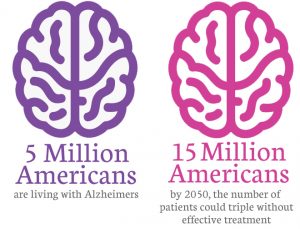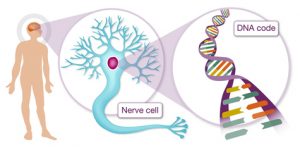The Concordia College Neuroscience Program aims to consider and connect as many interdisciplinary perspectives as possible. As students, we are taught to think critically and connect our experiences to the curriculum. This perspective helps in discussing the possible causes and connections in neurodegenerative diseases. When discussing Alzheimer’s Disease this week, the class considered the similar pathways and concepts we learned last week with Autism Spectrum Disorder (ASD). Students also considered their personal connections and experiences with neurodegenerative diseases.
 Although we have all learned about Alzheimer’s Disease in our courses, many of us also have personal connections to the neurodegenerative disease. According to the 2018 facts and figures released by the Alzheimer’s Association, 5.7 million Americans currently live with Alzheimer’s Disease. The number of deaths related to Alzheimer’s Disease has increased by 123% from 2000-2015. The association notes that every 65 seconds, another individual develops Alzheimer’s Disease in the United States. Cases of dementia, including Alzheimer’s Disease, are responsible for the death of 1 in 3 senior Americans–this is more than Breast Cancer or Prostate Cancer combined.
Although we have all learned about Alzheimer’s Disease in our courses, many of us also have personal connections to the neurodegenerative disease. According to the 2018 facts and figures released by the Alzheimer’s Association, 5.7 million Americans currently live with Alzheimer’s Disease. The number of deaths related to Alzheimer’s Disease has increased by 123% from 2000-2015. The association notes that every 65 seconds, another individual develops Alzheimer’s Disease in the United States. Cases of dementia, including Alzheimer’s Disease, are responsible for the death of 1 in 3 senior Americans–this is more than Breast Cancer or Prostate Cancer combined.

Like a few of the other students in the class, I have a familial connection to Alzheimer’s Disease. Due to many members within the older generation of my family developing Alzheimer’s Disease, I fear that I too may develop the disease in the later years of my life. We know from previous research that there is a hereditary factor linked to Alzheimer’s Disease. Previous research has shown that mutations in genes APP, PSEN1, and PSEN2 have linkages to early onset Alzheimer’s. Likewise, research on late-onset Alzheimer’s Disease found 20 different genetic loci associated with the disease. Specifically, APOE4 is a gene correlated with the familial development of Alzheimer’s Disease–one that shows the heritability of the disease. Regardless of the heritability and genetic factors of dementia, previous research has also shown the importance of the environmental factors associated with the development of the disease–and in many cases, the genetic and environmental factors both contribute to the development of Alzheimer’s Disease. Paying attention to these environmental factors may decrease my chances of developing this neurodegenerative disease.
These environmental factors include:
- Diet
- Type 2 Diabetes has been linked to Alzheimer’s
- The insulin resistance leading to Type 2 Diabetes likely stems from a fatty diet
- Other popular media articles have discussed how red meat might lead to Alzheimer’s
- The prevalence of Alzheimer’s Disease in the United States more than likely is due to our diet and lack of exercise.
- Exposure to toxic chemicals
- Serious brain injury
- Air pollution
 When discussing Alzheimer’s Disease and many other neurodegenerative diseases, it remains important to note the vital interaction between genetic and environmental factors resulting in the development of disease. With the prevalence of genetic testing in today’s society, specifically through companies like 23andMe, people can know in approximately 6-8 weeks if they possess some of the genes associated with Alzheimer’s Disease. Without proper consideration or education, members of society may be mislead to think that they are destined to develop the disease. That may not be the case. It is more likely that even if an individual possesses the gene associated with a disease, environmental factors play a large role in whether or not that gene is transcribed or “turned on.” Research has shown that paying attention to the environmental risk factors above, and changing lifestyles to match, may reduce a person’s risk for Alzheimer’s Disease.
When discussing Alzheimer’s Disease and many other neurodegenerative diseases, it remains important to note the vital interaction between genetic and environmental factors resulting in the development of disease. With the prevalence of genetic testing in today’s society, specifically through companies like 23andMe, people can know in approximately 6-8 weeks if they possess some of the genes associated with Alzheimer’s Disease. Without proper consideration or education, members of society may be mislead to think that they are destined to develop the disease. That may not be the case. It is more likely that even if an individual possesses the gene associated with a disease, environmental factors play a large role in whether or not that gene is transcribed or “turned on.” Research has shown that paying attention to the environmental risk factors above, and changing lifestyles to match, may reduce a person’s risk for Alzheimer’s Disease.
https://www.alz.org/media/HomeOffice/Facts%20and%20Figures/facts-and-figures.pdf